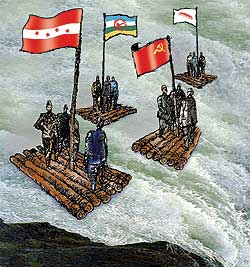 The latest Himalmedia-AC Nielsen ORG Marg opinion poll ("Vox populi", #114) provides a pristine portrait of public perceptions of politicians, democracy, the palace, military and the Maoists. It would have been nice to know how many Nepalis blame themselves for their plight.]
The latest Himalmedia-AC Nielsen ORG Marg opinion poll ("Vox populi", #114) provides a pristine portrait of public perceptions of politicians, democracy, the palace, military and the Maoists. It would have been nice to know how many Nepalis blame themselves for their plight.] The national psyche has never been hurt this hard. This is not to discount the upheaval our forebears had to endure during peace and war. It's just to suggest that the isolation and ignorance of their times must have brought greater bliss. When the drought in western Nepal conspires with the demolitions on the West Bank to disturb Nepali minds, you're forced to compute the limits of endurance.

Intentional infliction of emotional distress is agonising enough in the best of times. The pain becomes more excruciating when you feel helpless. The healing process can begin when we concede we are part of the problem and the solution. The people must rise up taller to their role as custodians of sovereignty.
When politics is viewed with a mutable mixture of awe, amusement and antipathy, it's hard not to be put off by the practitioners' perennial pranks. Can we still count how many post-1990 governments were brought down by the ruling party? Or how the opposition parties managed to get the prime minister they wanted? (Remember that rally the UML took out across the heart of Kathmandu in support of former prime minister Sher Bahadur Deuba's land-reform agenda last year while the Kangresis were up in arms?)
In a polity that tends to measure success in direct proportion to the next guy's failure, perversion is compelled to acquire art form. Kangresis, bampanthis and purba panchas took little time in settling the plagiarism row triggered by Girija Prasad Koirala's "broader democratic alliance" proposal once they turned consensus-building into a tool of cornering the prime minister of the day. (Too bad, they couldn't muster the resolve to resist Deuba enticements until the very end.) When those wedded to the preservation of people power divorce themselves from the basic prudence it presupposes, the deal is doomed.
Opposition to injustice merely to avoid becoming a victim doesn't impair one's ability to inflict it on others. This Platonism explains how some of our most liberal leaders can be such autocratic individuals.
Life is complicated by other paradoxes that piqued the ancient Greek philosophers. In simpler matters like shoemaking, for instance, we think only a specially trained person will serve our purpose. How can we presume that everyone who knows how to get votes knows how to administer a city or state? But, then, we still wouldn't be able to find a way of barring incompetence and knavery from public office without encroaching upon our equality as human beings. When the same reviled people get re-elected, the system decays. We, the people, are partly to blame for the putrefaction. The culture of impunity will thrive as long as the electorate refuses to take responsibility for those it elects.
We can start by ceasing to equate achievement with perfection. Our politicians are guided by the same values, attitudes, needs and expectations we have. When we hold them to standards higher than those we are ready to adopt, disappointment is bound to abound. Did we become so euphoric about the anti-corruption campaign because of our abhorrence of tainted transactions. Or because we could no longer stand that class of people that had become sickeningly ostentatious in flaunting their ill-gotten wealth in the neighbourhood? Why were those images of multi-storeyed houses and late-model cars allowed to block candid discussions on the macro-economic virulence of corruption? The millions stashed away by some leaders who walked the streets of the capital wearing incongruous pairs of slippers a decade ago have tarnished their democratic credentials. Politics cannot be cleansed by berating the entire fraternity as corrupt. Love 'em or hate em, but learn to live with them. They're the ones who will uphold our freedom to choose the people we can blame.
One-third of those polled felt an all-party government was best placed to solve the country's problems. That's no small tribute to the structural resilience of democratic institutions. As long as endemic vilification distorts our capacity for eternal vigilance, we'll continue complaining how each government turns out to be worse than its predecessor.


